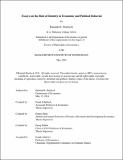Essays on the Role of Identity in Economic and Political Behavior
Author(s)
Ruebeck, Hannah K.
DownloadThesis PDF (43.47Mb)
Advisor
Schilbach, Frank
Duflo, Esther
Pathak, Parag
Terms of use
Metadata
Show full item recordAbstract
These essays consider the role of various personal and social identities and resulting decision-making in the domains of education, work, and political participation. The first essay studies beliefs about experiencing racial or gender discrimination, or perceived discrimination, and its consequences for worker behavior. Using a large randomized controlled trial (RCT, N=5,000) in a constructed online labor market, I show that perceived racial and gender discrimination has large negative effects on worker retention, future labor supply, and cooperation with managers and that these effects are driven by large psychological costs to interacting with a biased manager. Firms can therefore improve both equity and efficiency by reducing perceived discrimination. I then test whether implementing hiring procedures that reduce the potential for actual discrimination are effective at reducing perceived discrimination. The procedures I test—blinding hiring managers to demographics and using unbiased algorithms—at best moderately reduce rates of perceived discrimination when members of minority groups remain highly under-represented.
The second essay studies childhood confidence, a potential determinant of educational and labor-market behavior when ability is imperfectly observed. This essay documents two main facts in a large, national sample of children whose outcomes are followed for 20 years. First, childhood confidence in math and reading is starkly gendered along stereotypical lines: girls are more likely to be under-confident in math and over-confident in reading, and vice-versa for boys. Second, childhood over- and under-confidence in math strongly predicts adolescent test scores, educational attainment, and majoring or working in STEM.
The final essay studies political efficacy, or beliefs about government responsiveness to citizen preferences and action in an RCT with 6,000 participants. In the context of US climate policy, we test how these beliefs and preferences for government action change when citizens learn about the recent, largest climate bill in US history. Learning about policy progress has small positive effects on political efficacy and small negative effects on preferences for the government to focus on climate policy. These countervailing effects may be why we see no effect of this treatment on citizen climate action. On the other hand, additionally watching a short, fictional narrative about a young, initially apathetic woman who goes on to organize a climate march has large effects on political efficacy and subsequently large effects on donations to climate lobbying groups and revealed interest in climate marches.
JEL Codes: D91, J7, J16
Date issued
2024-05Department
Massachusetts Institute of Technology. Department of EconomicsPublisher
Massachusetts Institute of Technology